This document provides an overview of the contents and structure of an English language textbook. It lists the units and chapters and provides a brief description of the grammar, vocabulary, skills and exam focus covered on each page. The units cover topics such as family, food, work, appearance, education, sport, travel, nature and more. Each unit includes reading, listening, speaking and writing exercises, as well as grammar and vocabulary practice. There are also word lists and reviews provided at the end.

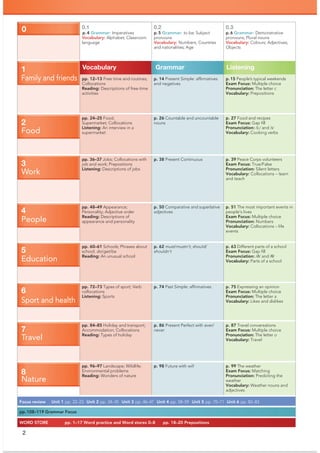






















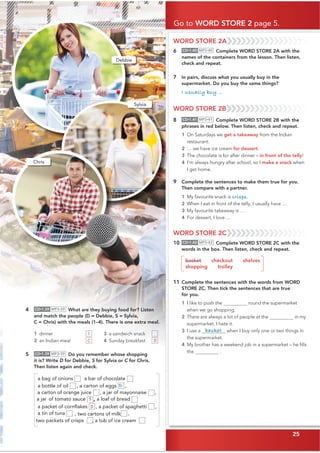






![32
2.7 Writing
4 Complete the WRITING FOCUS with the headings from
Exercise 3.
5 Read the example sentences in the tables. Then choose
the correct options in the sentences below.
Subject Verb Article Adjective
Object
(noun)
Everyone
You
It
makes
make
is
Ø
Ø
a
Ø
delicious
bring-your-own
food.
salads.
party.
Subject to be Adjective
Your pizzas are fantastic!
1 The subject comes before / after the verb.
2 The adjective usually comes before / after the noun.
3 When there is no object, the adjective comes before /
after the verb to be.
An email of invitation
I can write an email to invite a friend to my party.
1 Discuss the questions in pairs.
1 How often do you go to parties?
2 Do you bring anything with you? If yes, what?
2 Read the email. Does Emma mention any of the things
you bring to parties?
To: Anna
Subject: Invitation
[A]
Hi Anna,
[B]
How are you?
[C]
Would you like to come to my party? [D]
It’s on
Saturday at my house at 7.30 p.m. It’s a ‘bring-your-
own’ party – everyone makes some food and brings
a drink. Then we all eat the food together! You can
make any recipe you want. Your pizzas are fantastic
and you always make delicious salads too. Or you
can bring an interesting dessert. :-)
[E]
Can you come? What can you make? Email or text
me and let me know!
[F]
Love,
Emma xxx
A
3 Read the email again. Match the parts of the email
(A–F) with the descriptions (1–6).
1 making the invitation
2 finishing the email
3 asking for confirmation
4 giving the details (where? when? what kind of party?)
5 greeting
6 opening the email
WRITING FOCUS
An email of invitation
• Greeting
Hi John,
Hello!
• @@@@@@@@@@@@@
How are you?/How are things?
• @@@@@@@@@@@@@@
Would you like to come to my party?
Do you want to come to a party?
•
It’s on Friday. It’s at 8 p.m./It’s on Friday at 8 p.m.
It’s at my house/at Moon Club.
It’s a birthday/fancy-dress/bring-your-own/after-exams party.
•
Can you come?
Email or text me and let me know.
I hope you can come! Let me know!
•
Love,/Lots of love,
Best wishes,
@@@@@@@@@@@@@@](https://image.slidesharecdn.com/5371-focus1-231208120058-06c55828/85/537_1-Focus-1-Student-s-Book_2016-120p-pdf-32-320.jpg)




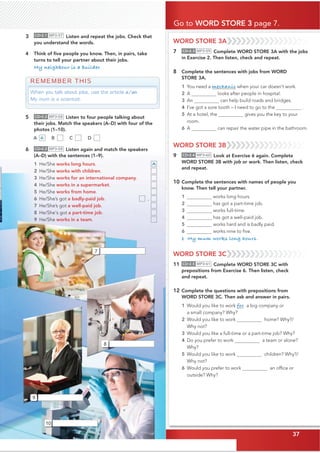






![44
3.7 Writing
1 CD•2.13 MP3•69 Listen to the conversation between
Rose and her boss, Jeremy. What does Jeremy want
Rose to do? Complete the notes.
An email of request
I can write an email to ask someone to do something.
5 Read the second email again and match the parts (A–C)
with the descriptions (1–3).
1 Rose asks Greg to do some things.
2 Rose introduces her problem.
3 Rose thanks Greg and says she’s sorry for the trouble.
6 Complete the WRITING FOCUS with words and phrases
from the second email.
WRITING FOCUS
An email of request
• Introduction
.
I’ve got a 1
problem .
I need your/some 2
Could you help me?
Could you do me a favour?
• Requests
Please 3
you …?
Could you please …?
Do you think you could …?
Could you also …?
• Conclusion
(So) Sorry to 4
you.
Thanks 5
./Thank you very much.
phone a 1
restaurant
order 2 for 3 people
(for the meeting)
remember to order something for 4
need lunch by 5
prepare bags of 6 for customers
4 Read the second email. Why is it better?
To: Greg Sutter
From: Rose Orton
Subject: Tomorrow’s meeting
Greg,
Phone a restaurant and order lunch for the people at the
meeting. Order something for vegetarians too. Prepare
bags of presents for everyone. Use the pens in my desk.
Rose
To: Greg Sutter
From: Rose Orton
Subject: Tomorrow’s meeting
Greg,
[A]
I’ve got a problem and I need your help with tomorrow’s
meeting. I’ve got an exam in half an hour and I haven’t
got the time to do this.
[B]
Please could you phone a good restaurant and order lunch
for twelve people for tomorrow’s meeting at 12.30? Could
you order some vegetarian dishes, too? Also, we need to
prepare bags of presents for the customers. There are
twenty expensive pens in a box in my desk and you could
use those. The receptionist has got company bags to put
them in.
[C]
Sorry to bother you, but I just don’t have the time.
Thanks a lot,
Rose
2 What is Rose’s problem and how do you think she
decides to solve it?
3 Read the first email. What is wrong with it?
1 There is not enough information.
2 There is too much information.
3 The message is not clear.
4 The request is not polite.
5 The message is too long.
✓
A
lunch](https://image.slidesharecdn.com/5371-focus1-231208120058-06c55828/85/537_1-Focus-1-Student-s-Book_2016-120p-pdf-44-320.jpg)











![56
4.7 Writing
1 Match the information people sometimes give about
themselves in a personal profile (1–5) with the extracts
from an email (a–e).
a They play rock and I’d love to see them in concert.
b One day I’d like to be a teacher.
c I’ve got five cousins, but I don’t often see them.
d I’m quite a creative person.
e I’m not very tall and I’ve got medium length hair.
2 Read Emily’s profile. Match three of the points (1–5) in
Exercise 1 with the paragraphs (A–C).
A personal profile
I can write a personal profile on a blog.
3 Read Emily’s profile again and complete the table.
Emily
Age
Height 1.65 m
Build slim
Hair and eyes
Personality
Interests
Family
4 Complete the WRITING FOCUS with examples from
Emily’s profile.
5 Rewrite the sentences with the adverbs in brackets in
the correct place.
1 He’s got short red hair. (very)
He’s got very short red hair.
2 I’m serious. (not very)
3 I like computer games. (quite)
4 I enjoy watching films. (not really)
5 I’ve got long blond hair. (really)
6 My best friend is fit. (very)
6 Rewrite the sentences with the adjectives and adverbs
in brackets in the correct place.
1 I’ve got black hair (wavy, short).
I’ve got short wavy black hair.
2 I’ve got wavy hair (beautiful, blond).
3 He’s got eyes (blue, big).
4 I’m tall (not very), but I’m well-built (quite).
5 She’s got brown hair (curly, long) and a smile
(big, lovely).
WRITING FOCUS
A personal profile
• Start your profile with a physical description:
1
• Write about your personality:
2
• Write about your family and friends:
3
• Use adverbs (really, quite, very, not very, not really, etc.)
to make your writing more interesting:
• with adjectives:
4
• with like/enjoy:
5
Notice the position of adverbs with adjectives and with verbs:
very clever, really enjoy.
• Don’t use not with quite + personality adjective.
Hi! I’m Emily.
[A]
I’m sixteen years old.
I’m quite tall – I’m 1.65 m
and I’m slim. I’ve got
long wavy brown hair and blue eyes.
[B]
I’m a positive person and I’m very sociable –
I’ve got lots of friends. I like going out with my
friends and having fun. I really enjoy sports
especially tennis . $ut I’m not very Ƃt. I also
spend quite a lot of time shopping for clothes!
And of course, I love fashion (that’s why I’m
writing this blog!). My friends say I’m kind and
I’ve got a good sense of humour. I like laughing
a lot.
[C]
I’ve got a brother and a sister. My brother is
fourteen, but he’s taller than me. He’s got short
dark hair and blue eyes. He’s really funny! My
sister is ten. She’s quite tall, but she isn’t taller
than me. She’s very clever. She’s got long
straight blond hair and green eyes.
So now you know all about me!
BLOG
I’m quite tall.
1 information about your family
2 a physical description
3 information about your favourite band
4 a description of your personality
5 a list of your ambitions
c](https://image.slidesharecdn.com/5371-focus1-231208120058-06c55828/85/537_1-Focus-1-Student-s-Book_2016-120p-pdf-56-320.jpg)






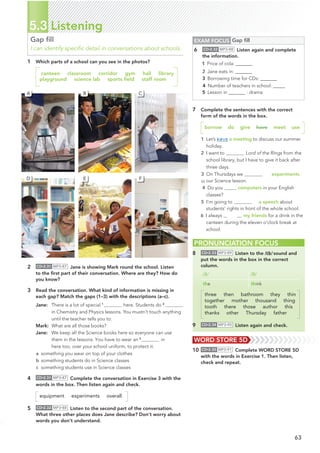




![68
5.7 Writing
1 Which of these topics would you not write about in an email to a
friend about a new school?
• the other students
• activities you are doing
• your favourite film
• your news
• school sports teams
2 Read the email. Which topic does Jen not write about?
A personal email
I can write to someone and tell them news about school.
3 Read the email again. Match the parts of the email (A–E) with the
descriptions (1–5).
1 asking about the other person
2 giving your news
3 signing off
4 greeting
5 asking how someone is
4 Complete the WRITING FOCUS with the
expressions in purple in the email.
WRITING FOCUS
A personal email
• Asking about someone
1
How are you?/How are things?
I hope you’re fine!/I hope you’re not too busy!
How’s everyone?
• Giving your news
I’m getting on OK/fine/well.
What else?
I’d love to ...
• Asking about the other person
What are you up to?
What are your plans for this weekend/
the holidays?
How’s life?
What’s your news?
• Signing off
Write soon!
I hope to hear from you soon!
I miss you!/I miss you all!
[A]
Hi Mark,
[B]
How are you? I hope you’re Ƃne and not too busy!
[C]
I’m getting on OK at my new school. It’s great because
everyone’s very friendly. I don’t know my way round the school
yet. I get lost all the time, but someone always helps me Ƃnd
the right place. What else? The trials for the hockey team are
next week. I’d love to be in the team, so I have to practise really
hard. My other news is that I’m in a band! There are six of us in
the band. I play the guitar (of course!) and it’s great fun.
[D]
How about you? Are you still in the volleyball team? What
are your plans for this weekend? Do you want to come and
stay soon?
[E]
Write soon! I can’t wait to hear all your news! I miss you all!
Love,
Jen
1
Hi Sandy,
How are you? How’s 2
_@@@@@@@? I hope
they’re all well.
I’m 3
_______ on Ƃ ne at school at the
moment. We’ve got a new teacher for Maths.
What 4
____ ? I won my swimming
competition!
What are you 5
_______ to at the moment?
What’s your 6
_______ ? Are you doing
anything interesting?
I hope to7
@@@@@@@__ from you soon.
I 8
_______ you all!
Bye for now,
Maddy
D
k
5 Complete the email with one word in
each gap.
2
3
4](https://image.slidesharecdn.com/5371-focus1-231208120058-06c55828/85/537_1-Focus-1-Student-s-Book_2016-120p-pdf-68-320.jpg)
















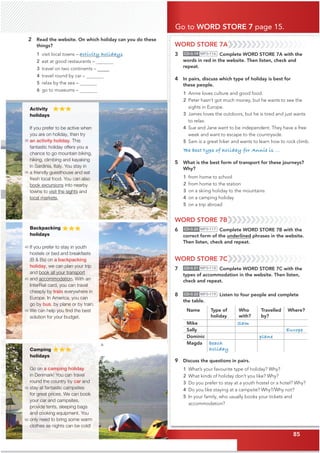






![92
7.7 Writing
1 Read Laura’s email and answer the questions.
1 What did Laura leave in the hotel?
2 What does she want the hotel to do?
2 Read the email again. Match the parts of the
email (A–F) with the descriptions (1–6).
1 saying what you want to happen
2 conclusion
3 greeting
4 ending the email
5 giving your contact details
6 explaining why you are writing
An email of enquiry
I can write a formal email of enquiry.
4 Match the informal enquiries (1–5) with the more formal
ones (a–e).
1 Send me my iPod.
2 Can I book a room?
3 Ask all the staff.
4 Can you send my mobile phone to me?
5 Give me your website address.
a Would it be possible to book a room?
b I hope you are able to send my mobile phone to me.
c Please could you send me my iPod?
d Would it be possible to give me your website address?
e Could you please ask all the staff?
WRITING FOCUS
A formal email
• Starting a formal email
1
Dear Sir or Madam,/Dear (Mrs Jackson/Mr Smith),
• Saying why you are writing
I am writing
• to 2
if anyone has found …
• to enquire about your special offers.
• in response to your newspaper advert.
• Saying what you want
Please 3
you …?/I4
you are able to …
Would it be possible to …?/I 5
be happy to
…
• Giving contact details
Please reply to this email.
Email me at …/My email is …
My (mobile) phone number is …Please
phone me 6
my mobile.
• Conclusion
I look forward to hearing from you.
Thank you for your help with this matter.
• Ending a formal email
7
, (if you began Dear Sir or Madam,)
Yours sincerely, (if you began Dear + name)
To: Hotel reception
Subject: Lost watch
[A]
Dear Sir or Madam,
[B]
I was a guest at the hotel on 21 July in
room 219 and I believe that I left my watch
on the table next to the bed. I am writing
to enquire if anyone has found it. It is a gold
watch with a black leather strap.
[C]
Please could you confirm by replying to
this email or phoning me on my mobile
number: 07841 223679. [D]
I hope you are
able to send the watch to me by courier
when you find it. I would be happy to pay
for the postage.
[E]
I look forward to hearing from you. Thank
you for your help with this matter.
[F]
Yours faithfully,
Laura Dryden
k
3 Compete the WRITING FOCUS with the words in purple
in the email.
D
c](https://image.slidesharecdn.com/5371-focus1-231208120058-06c55828/85/537_1-Focus-1-Student-s-Book_2016-120p-pdf-92-320.jpg)











![104
8.7 Writing
1 Read the sentences and check you understand the words in
purple. Then, in pairs, tick the things you do to protect the
environment. Compare your ideas with other pairs.
To protect the environment we should:
• sort our rubbish for recycling.
• turn off the light, the computer and all other electronic
equipment when we’re not using it.
• save water – for example, turn off the water tap when we
clean our teeth.
• walk and cycle more.
• buy recycled things.
• plant trees.
• buy less and throw away less.
2 Read the blog and answer the questions.
1 What does the writer think we should do to protect the
environment?
2 What three arguments does he give for his opinion?
3 Do you agree with him? Why?/Why not?
Expressing an opinion; presenting arguments
I can express my opinion in writing with reasons and
explanations.
3 Read the blog again. Match the parts of the
blog (A–E) with the descriptions (1–5).
1 Add another argument.
2 Repeat your opinion and/or encourage
the reader to do something.
3 Add the final argument.
4 State your opinion. A
5 Give the first explanation/argument.
4 Complete the WRITING FOCUS with the
words in purple in the blog.
WRITING FOCUS
Expressing an opinion; presenting
arguments
• Stating your opinion
I think/I believe …
In my 1
opinion , …
It seems (to me) …
In my view, …
• First argument
Firstly, … First 2
, …
• Next argument(s)
Secondly, …
In 3
, …
Also,
• Final argument
4
, … Lastly, …
5 Replace the words in purple in the blog with
different phrases from the WRITING FOCUS.
Environment blog
Go veg to save the planet
by SamHarvey
[A]
In my opinion, the best thing we can do for our planet is to
become vegetarians.
[B]
First of all, there is a lot of waste when we produce meat.
For example, you need about sixteen kilograms of cereal
and nearly 20,000 litres of water to produce one kilogram
of meat. We should stop producing meat and grow cereals
for humans instead. It will be much easier to feed all the
people in the world.
[C]
In addition, you need a lot of land to keep large farm
animals such as cows. In South America, farmers are
destroying tropical forests to create space for cows which
will become hamburgers in other countries.
[D]
Finally, remember the animals themselves! Animals on
large ‘factory farms’ have a terrible life and a terrible death.
[E]
You don’t even have to stop eating meat completely. Just
eat less. You’ll help save the Earth and feed everyone on it!
GREENER](https://image.slidesharecdn.com/5371-focus1-231208120058-06c55828/85/537_1-Focus-1-Student-s-Book_2016-120p-pdf-104-320.jpg)















